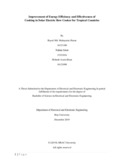| dc.contributor.advisor | Azad, A.K.M Abdul Malek | |
| dc.contributor.author | Hasan, Rayed Md. Muhaymin | |
| dc.contributor.author | Islam, Nahian | |
| dc.contributor.author | Khan, Mehrab Azam | |
| dc.date.accessioned | 2020-02-05T05:30:52Z | |
| dc.date.available | 2020-02-05T05:30:52Z | |
| dc.date.copyright | 2019 | |
| dc.date.issued | 2019-12 | |
| dc.identifier.other | ID 16121100 | |
| dc.identifier.other | ID 15321016 | |
| dc.identifier.other | ID 16121098 | |
| dc.identifier.uri | http://hdl.handle.net/10361/13734 | |
| dc.description | This thesis is submitted in partial fulfillment of the requirements for the degree of Bachelor of Science in Electrical and Electronic Engineering, 2019. | en_US |
| dc.description | Cataloged from PDF version of thesis. | |
| dc.description | Includes bibliographical references (pages 108-110). | |
| dc.description.abstract | The cooking system has been evolving for a long time. From the parabolic system to solar cooking. Every method had its unique concepts. Attempts towards solar cooking have always been proven beneficent and successful. Solar cooking is a system where energy comes from the photovoltaic solar panel which is functional to solar. Solar energy is renewable energy. Renewable energy is currently the biggest R&D at this moment. The amount of non-renewable energy is decreasing day by day and increasing global warming simultaneously. Bangladesh is at no different point. We have very limited non-renewable energy and it's decreasing day by day. Only 6% of the country's total population has access to natural gas, primarily in urban areas. Keeping in mind the potential of solar energy, our goal is to design an electric stove that will use solar energy. The main source of power is solar in addition to 48V batteries as back up and the main grid as emergency backup. This system is run by two burners which are controlled by a heat controller. The batteries are charged by photovoltaic solar panels when the batteries are not being used. Heat controllers are also used to vary the temperatures. As it is called an improved version, this stove is structured over verification of a double burner stove named "Performance and Testing of the Improved Solar Electric Cooking System". In this improved version we have worked to bring out some significant changes involving size, material, cost, cooking time and design. Here we have presented a comprehensive study over performance-based and test analysis between both stoves comparing theoretically, experimentally, and development works. To justify our result, impedance has been matched to get the maximum output power. Cooking time data and input power vs output power data has been analyzed to obtain optimum results. To compare the effectiveness as compared to natural gas, this thesis has several analyzed data that were taken under different electrical components or materials. Finally, we have come up with the best and effective solution for the urban areas of the country which will help to reduce the usage of non-renewable gas and electricity too. | en_US |
| dc.description.statementofresponsibility | Rayed Md. Muhaymin Hasan | |
| dc.description.statementofresponsibility | Nahian Islam | |
| dc.description.statementofresponsibility | Mehrab Azam Khan | |
| dc.format.extent | 110 pages | |
| dc.language.iso | en | en_US |
| dc.publisher | Brac University | en_US |
| dc.rights | Brac University theses are protected by copyright. They may be viewed from this source for any purpose, but reproduction or distribution in any format is prohibited without written permission. | |
| dc.subject | Energy efficiency | en_US |
| dc.subject | Cooking | en_US |
| dc.subject | Solar electric | en_US |
| dc.subject | Tropical countries | en_US |
| dc.subject | Electric cooking system | en_US |
| dc.subject.lcsh | Solar energy | |
| dc.subject.lcsh | Solar cooking | |
| dc.title | Improvement of energy efficiency and effectiveness of cooking in solar electric slow cooker for tropical countries | en_US |
| dc.type | Thesis | en_US |
| dc.contributor.department | Department of Electrical and Electronic Engineering, Brac University | |
| dc.description.degree | B. Electrical and Electronic Engineering | |

